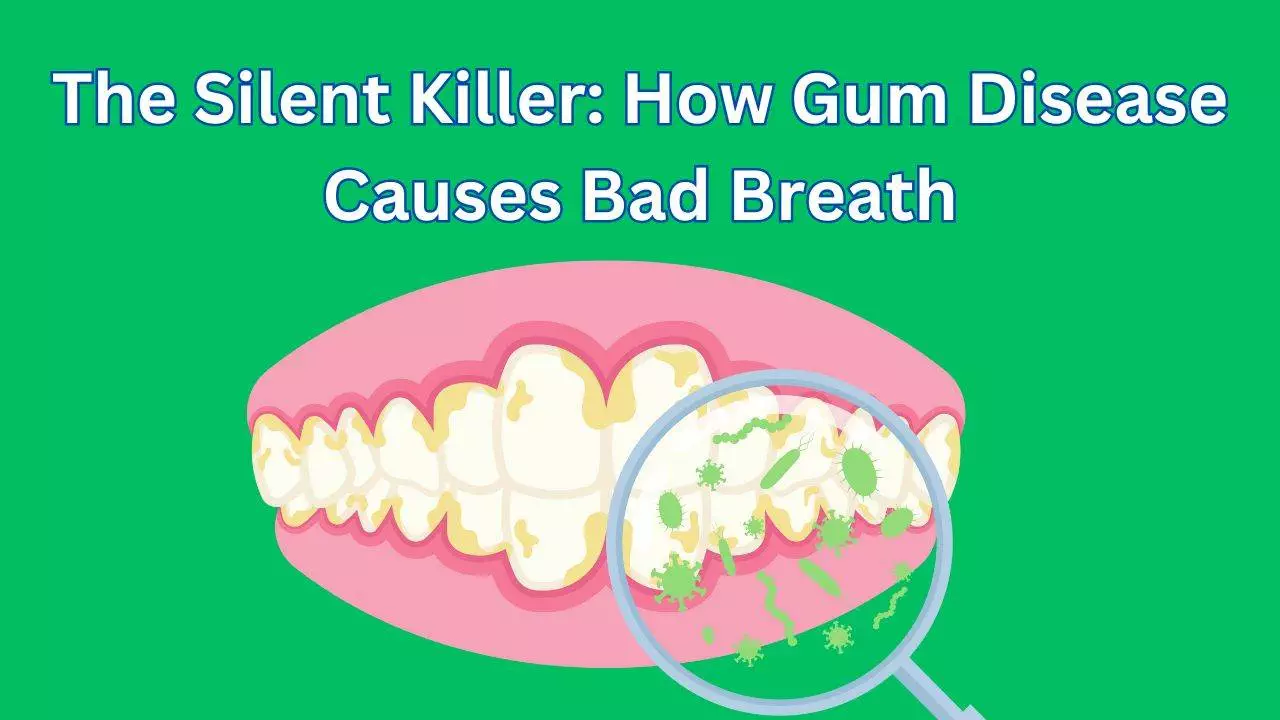
- What is Gum Disease and How Does it Develop?
- The Role of Plaque and Tartar in Gum Disease
- Understanding the Signs and Symptoms of Gum Disease
- How Gum Disease Affects Your Oral Health
- The Connection Between Gum Disease and Systemic Health
- The Role of Bacteria in Bad Breath
- How Gum Disease Causes Chronic Bad Breath
- The Impact of Gum Disease on Your Social Life
- Treatment Options for Gum Disease and Bad Breath
- Prevention Strategies for Maintaining Good Oral Health
Bad breath, also known as halitosis, is a common problem that affects many people. It can be embarrassing and have a negative impact on one’s self-esteem and social interactions. One of the leading causes of bad breath is gum disease. Understanding the link between gum disease and bad breath is crucial for maintaining good oral health.
What is Gum Disease and How Does it Develop?
Gum disease, also known as periodontal disease, is a bacterial infection that affects the gums and bone that support the teeth. It develops when plaque and tartar build up on the teeth and gums. Plaque is a sticky film of bacteria that forms on the teeth and gums. If not removed through proper oral hygiene practices such as brushing and flossing, plaque can harden into tartar, which can only be removed by a dental professional.
The Role of Plaque and Tartar in Gum Disease
Plaque and tartar are the main culprits behind gum disease. Plaque contains bacteria that release toxins that irritate the gums, causing inflammation and infection. If left untreated, the infection can spread to the bone that supports the teeth, leading to tooth loss.
Tartar, also known as calculus, is hardened plaque that forms when plaque is not removed through regular brushing and flossing. Tartar provides a rough surface for more plaque to accumulate, making it harder to remove. This buildup of plaque and tartar can lead to gum disease.
Understanding the Signs and Symptoms of Gum Disease
Recognizing the signs and symptoms of gum disease is essential for early detection and treatment. Symptoms of gum disease include red, swollen, and bleeding gums, bad breath, loose teeth, receding gums, and changes in bite or tooth alignment.
If you notice any of these symptoms, it’s important to seek treatment from a dental professional as soon as possible. Early intervention can help prevent the progression of gum disease and minimize the risk of tooth loss and other serious oral health problems.
How Gum Disease Affects Your Oral Health
Gum disease not only affects the gums but also has a significant impact on overall oral health. As the infection progresses, it can destroy the bone that supports the teeth, leading to tooth loss. In fact, gum disease is one of the leading causes of tooth loss in adults.
Additionally, gum disease can cause other oral health problems such as gum abscesses, tooth sensitivity, and difficulty chewing. It can also affect the appearance of your smile, as receding gums can make teeth appear longer and create gaps between teeth.
The Connection Between Gum Disease and Systemic Health
Research has shown a link between gum disease and systemic health problems. The bacteria from gum disease can enter the bloodstream and travel to other parts of the body, contributing to the development or worsening of various health conditions.
Studies have found associations between gum disease and conditions such as heart disease, diabetes, stroke, respiratory infections, and preterm birth. It is believed that the inflammation caused by gum disease may contribute to these systemic health problems.
The Role of Bacteria in Bad Breath
Bacteria in the mouth play a significant role in causing bad breath. These bacteria produce volatile sulfur compounds (VSCs), which have a foul odor. When these VSCs are released into the air through breathing or talking, they cause bad breath.
The bacteria that produce VSCs are often found in people with gum disease. The infection and inflammation associated with gum disease create an ideal environment for these bacteria to thrive and produce VSCs.
How Gum Disease Causes Chronic Bad Breath
Gum disease can cause chronic bad breath by providing a breeding ground for bacteria that produce VSCs. The infection and inflammation in the gums create pockets where bacteria can accumulate and multiply. These bacteria release VSCs, which contribute to the foul odor associated with bad breath.
Treating gum disease is essential for eliminating the source of bad breath. By addressing the underlying infection and inflammation, the bacteria that produce VSCs can be reduced, resulting in fresher breath.
The Impact of Gum Disease on Your Social Life
Bad breath caused by gum disease can have a significant impact on your social life. It can make you self-conscious and hesitant to engage in social interactions. You may avoid close conversations or feel embarrassed when speaking to others.
By seeking treatment for gum disease and addressing the underlying infection, you can improve your confidence and social interactions. Fresher breath can give you the assurance to engage in conversations without worrying about bad breath.
Treatment Options for Gum Disease and Bad Breath
Treatment options for gum disease vary depending on the severity of the infection. In the early stages, professional cleanings and improved oral hygiene practices may be sufficient to control the infection and prevent further progression.
In more advanced cases, a procedure called scaling and root planing may be necessary. This involves removing plaque and tartar from below the gumline and smoothing out the roots of the teeth to promote healing and prevent further buildup.
In severe cases, surgery may be required to remove infected tissue or reshape the gums to reduce pocket depth. Your dentist or periodontist will determine the most appropriate treatment plan based on your specific needs.
For bad breath caused by gum disease, treating the underlying infection is crucial. This may involve a combination of professional cleanings, antimicrobial mouth rinses, and antibiotics to eliminate bacteria and reduce inflammation.
Prevention Strategies for Maintaining Good Oral Health
Preventing gum disease and bad breath involves practicing good oral hygiene on a daily basis. This includes brushing your teeth at least twice a day with a fluoride toothpaste, flossing daily to remove plaque and food particles from between the teeth, and using an antimicrobial mouth rinse to reduce bacteria.
Regular dental checkups and cleanings are also essential for preventing gum disease and bad breath. Your dentist can detect early signs of gum disease and provide professional cleanings to remove plaque and tartar that cannot be removed through regular brushing and flossing.
Conclusion:
Gum disease is a serious oral health problem that can lead to bad breath and other health problems. Understanding the link between gum disease and bad breath is crucial for maintaining good oral and overall health. By practicing good oral hygiene, seeking treatment for gum disease, and addressing the underlying infection, you can improve your oral health, eliminate bad breath, and reduce the risk of tooth loss and systemic health problems.









